
- Start date
- Duration
- Format
- Language
- 11 Jun 2025
- 9 days
- Class
- Italian
A new approach to managing Calabria’s health care emergency is what events in the last few weeks have made more and more urgent. SDA Bocconi’s EMMAS - Executive Master in Management of Health and Social Care Organizations director Francesca Lecci has presented her ideas during the hearing at the Social Affairs Commission devoted to the draft law concerning measures to revive the public health care system in this Region. “Lecci’s speech has been most clear-headed and appropriate from a managerial point of view, which should exactly be Calabria’s Health Care Commissioner’s point of view”, according to the local press.
Any proposal for action should be based on data. Lecci has detailed four groups of data: “Healthy life expectancy in Calabria is 52,9 years against 67,3 in Trentino-Alto Adige; over 20% of Calabrians move to other Italian Regions for treatment; between 2010 and 2017 the Region has lost 17% of health care workforce and 25% of administration workforce in health care sector; and the Essential Levels of Assistance are sub minimal standards.” If we think that the Region’s public health care system has been under a central government commissioner for the last ten years now, it is our duty to understand what the causes of this situation are and how to get out of it, Lecci added.
Three key issues appear to remain unsolved by the present draft law. According to Lecci, the first issue is about governance. “It is not only desirable but essential now to establish a frame for the various health care players – central government, regional administration, local health care services – to interact without conflicting. This bill designs a ‘balances and counterbalances’ system which doesn’t appear to enable synthesis and consensus, and is divisive, instead.” What should be clearly defined, stated EMMAS director, are the process and criteria to appoint commissioners, the chain of command and the tasks and responsibilities of the various roles.
The topic of governance inevitably borders on performance. And performance should be sustainable in time: “Once they have been appointed, special commissioners shouldn’t be merely assessed on the formal decrees they issue, or on how they have managed to reschedule debt” – these are “accountant-style” actions and may enhance conflict. “Three or even five-year-time performance goals should be established, instead,” said Lecci, “with in-between assessment steps. Change management processes need time, especially when the challenges are tough, as they are in this case.”
Another thorny topic concerns the needs to resources ratio. A debt rescheduling plan implies becoming poorer from a quantitative and especially qualitative point of view. “The Covid-19 emergency has now unlocked financial resources but not capacity resources, which are the hardest to find”. And yet “we need talents who are willing – maybe for a limited period of time – to work and transfer health-care and managerial knowledge, to get technology going, acquire goods and services, rethink hospital networks and govern local general medicine.”
And finally we need to be back to data, and how to use them. Today, every managerial decision should be evidence-based, based on data. Especially in this context, data need to have four qualities: be meaningful, consistent, reliable and timely. “What I would ask the new commissioner,” EMMAS director concluded, “is no doubt to create a new cost accounting and to evaluate information needs – as set forth in the bill – but especially to figure out 20-25 performance indicators to guide the same commissioner’s technical action and therefore that of all Calabrian health care directors general and workforce.” In short, a strong and brave managerial hand to generate value in this complex and uncertain situation.
SDA Bocconi School of Management


Approfondire il contesto in cui operano gli attori del sistema salute, le principali tecniche per veicolare il valore di un farmaco e per una negoziazione sostenibile.

Doing a comprehensive strategic exercise as the executive leadership team of a hospital to test and strengthen managerial and organizational skills.

